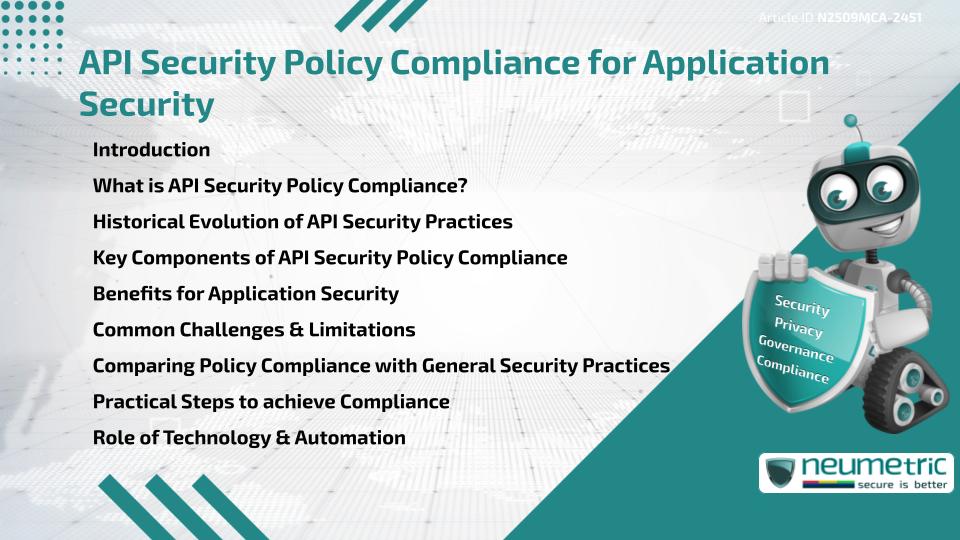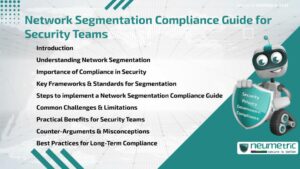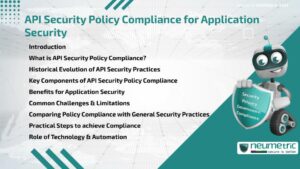Table of Contents
ToggleIntroduction
API Security Policy Compliance ensures that organisations follow established standards & rules to protect Application Programming Interfaces [APIs] from Threats. APIs are the backbone of modern applications, enabling communication between services. Without proper Compliance, they become vulnerable to data breaches, misuse & regulatory violations. By aligning with Security Policies, organisations can enhance Application Security, reduce Risks & build Trust with Users & Partners.
What is API Security Policy Compliance?
API Security Policy Compliance refers to adhering to internal & external rules governing the secure design, use & management of APIs. These Policies typically include Authentication requirements, Encryption protocols, Access Control & Monitoring practices.
For example, when an API shares Customer Data, Compliance requires ensuring Encryption during transmission, Authentication for access & logging of activities. This prevents misuse & ensures Accountability.
Historical Evolution of API Security Practices
In the early days, APIs were mostly private, serving internal systems with limited exposure. Security Policies were often minimal. However, with the rise of cloud services, mobile apps & Third Party integrations, APIs became public-facing, increasing Risks significantly.
The introduction of standards such as OAuth & OpenID Connect reshaped API security. Over time, regulators & industry bodies introduced Compliance expectations, making API Security Policy Compliance a critical part of application security strategies.
Key Components of API Security Policy Compliance
A strong Compliance Framework covers multiple components, including:
- Authentication & Authorisation: Ensuring only verified users & systems can access APIs.
- Encryption: Protecting data in transit & at rest using secure Protocols.
- Access Controls: Restricting permissions to the minimum required.
- Monitoring & Logging: Tracking API calls for Anomalies & Audits.
- Governance Policies: Aligning API use with regulatory & organisational standards.
Together, these components ensure APIs are protected across their entire lifecycle.
Benefits for Application Security
Adopting API Security Policy Compliance brings measurable benefits to application security:
- Prevents Data leaks & breaches
- Enhances Customer Trust by safeguarding Sensitive Information
- Protects against regulatory fines & reputational damage
- Provides consistency across all API interactions
- Strengthens resilience against emerging Cyber Threats
For developers & security teams, Compliance simplifies decision-making by offering clear rules & frameworks.
Common Challenges & Limitations
Organisations often face obstacles in maintaining API Security Policy Compliance, such as:
- Lack of awareness among developers about policy requirements
- Complexity in managing large numbers of APIs
- RAPId changes in both technology & regulations
- Resource constraints in monitoring & auditing APIs
- Potential false sense of security if Policies are outdated
These challenges underline the importance of Continuous Training, regular reviews & up-to-date Compliance frameworks.
Comparing Policy Compliance with General Security Practices
General API security practices may focus on technical safeguards such as firewalls or testing. While valuable, they can be inconsistent without a Compliance Framework. Policy Compliance ensures that Security Measures are not just Best Practices but enforceable, auditable standards.
This difference can be compared to road safety: while safe driving habits reduce accidents, Compliance with traffic laws enforces universal standards that protect everyone.
Practical Steps to achieve Compliance
Organisations can follow these steps to ensure API Security Policy Compliance:
- Develop & document API Security Policies aligned with Industry Standards.
- Implement strong Authentication & Encryption mechanisms.
- Train Developers & Stakeholders on Compliance Requirements.
- Use automated tools for Monitoring, Logging & Threat detection.
- Conduct regular Audits & update Policies as needed.
- Integrate Compliance checks into the API development lifecycle.
These steps help organisations build a proactive & sustainable Compliance culture.
Role of Technology & Automation
Technology plays a key role in supporting API Security Policy Compliance. Automated tools can:
- Scan APIs for Vulnerabilities before deployment
- Enforce Compliance through gateways & Access Controls
- Provide real-time monitoring of API activity
- Generate reports for Regulatory Audits
By leveraging automation, organisations reduce human error, streamline processes & maintain consistent Compliance across multiple APIs.
Takeaways
- Ensures APIs follow secure, enforceable standards
- Reduces Risks of breaches & data misuse
- Builds User & Partner Trust
- Strengthens application security frameworks
- Requires Continuous Monitoring & adaptation
FAQ
What is API Security Policy Compliance?
It is the process of following defined rules & standards to secure APIs & ensure they are used safely & responsibly.
Why is API Security Policy Compliance important for application security?
It prevents Data Breaches, ensures Regulatory Compliance & builds Trust with Users & Stakeholders.
What are common Policies included in API security?
Typical Policies cover Authentication, Authorisation, Encryption, Access Controls & Monitoring.
What challenges do organisations face in maintaining Compliance?
Challenges include lack of awareness, resource limitations, managing many APIs & keeping up with evolving regulations.
How can organisations achieve Compliance effectively?
They can implement clear Policies, train staff, use automated tools & conduct regular Audits.
Does automation play a role in Compliance?
Yes, automation helps enforce Policies, detect Risks & provide reliable Audit trails.
How often should API Security Policies be reviewed?
Policies should be reviewed at least annually or whenever there are significant changes in technology or regulation.
Need help for Security, Privacy, Governance & VAPT?
Neumetric provides organisations the necessary help to achieve their Cybersecurity, Compliance, Governance, Privacy, Certifications & Pentesting needs.
Organisations & Businesses, specifically those which provide SaaS & AI Solutions in the Fintech, BFSI & other regulated sectors, usually need a Cybersecurity Partner for meeting & maintaining the ongoing Security & Privacy needs & requirements of their Enterprise Clients & Privacy conscious Customers.
SOC 2, ISO 27001, ISO 42001, NIST, HIPAA, HECVAT, EU GDPR are some of the Frameworks that are served by Fusion – a SaaS, multimodular, multitenant, centralised, automated, Cybersecurity & Compliance Management system.
Neumetric also provides Expert Services for technical security which covers VAPT for Web Applications, APIs, iOS & Android Mobile Apps, Security Testing for AWS & other Cloud Environments & Cloud Infrastructure & other similar scopes.
Reach out to us by Email or filling out the Contact Form…





